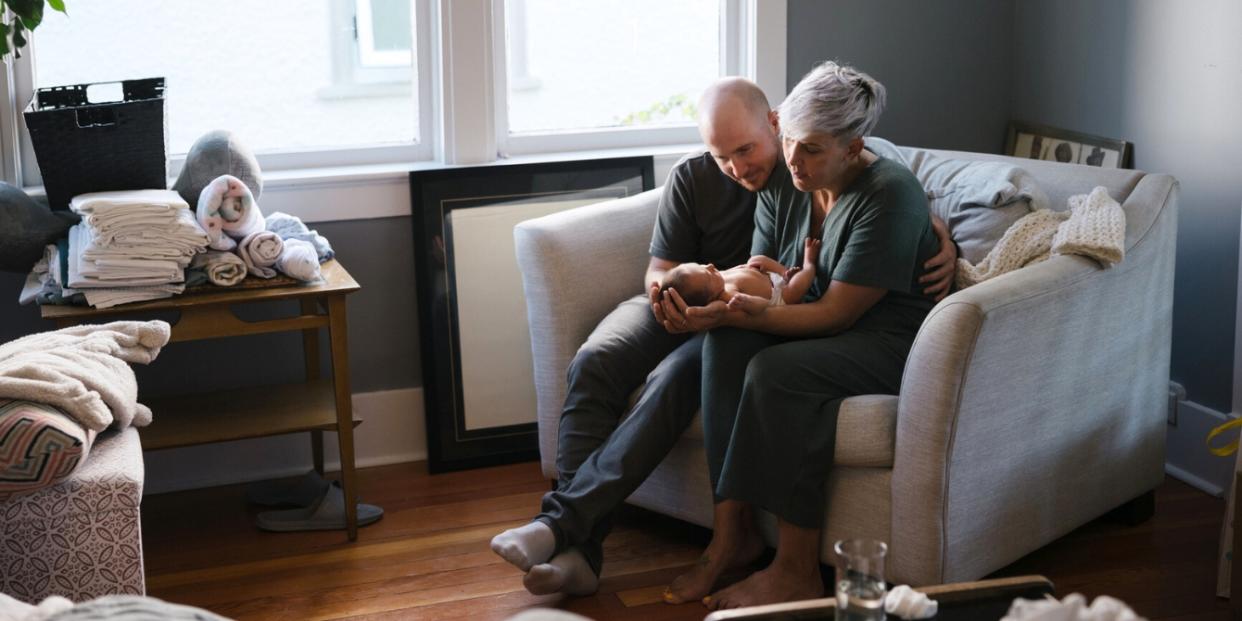This brilliant piece of parenting advice helped me avoid marital spats in early motherhood

“I cannot believe he put her in that outfit,” I remember complaining to my mom. I can’t recall exactly what I thought was so terribly offensive about how my husband had dressed our newborn daughter, but I do remember feeling righteously angry and like I needed to tell him exactly how poorly of a job I thought he had done.
My mom sat silently for a minute before turning to me and giving me the best piece of parenting advice that I’ve ever gotten: “You know, you don’t have to see everything,” she said.
She went on to explain that there will always be moments where I think people (my husband or others) have done something “the wrong way,” but that I will always have a choice about whether I say something about it or not.
Her tip is the number one piece of advice I now give new parents. It is so easy the first few months of becoming a parent to get in squabbles as you try to figure out your new little human. Babies don’t come with a manual—so you and your partner are going to do things differently. That will come with strong feelings over how those things should be done.
Choosing what to “see” and what to ignore can help cut down on unnecessary fights—and can help ensure both parents build confidence taking care of baby.
If the job is still getting done and no one is getting hurt, my mom cautioned me, there’s usually nothing positive to gain by bringing it up. Just because I would have dressed my daughter in something different doesn’t mean my husband had done it wrong, she reminded me.
And she was right. My daughter had clothes on. They were appropriate for the weather outside. The job had been done. Did it really matter if they didn’t match and weren’t what I would have put her in?
Choosing to say something probably would have caused a nitpicky fight, and definitely would have reduced my husband’s confidence in dressing her in the future. He probably wouldn’t have wanted to dress her in the future because of a fear of being reprimanded, which would put more work on me in the long run.
3 questions to ask—before you bring it up
This is the framework I use in situations to decide whether to “see” something and speak up about it or not. If the answer to any of these questions is yes, I’ll say something. If not, I try my best to follow my mom’s advice and stay quiet (which, let’s be honest, doesn’t always happen. But I’m trying!).
1. Are they creating more work by doing it this way?
If my husband had been in the process of putting a short sleeve bodysuit on our daughter in December, someone would have had to take it off and start over again. At that point it would have been advantageous to say something to prevent that extra work.
2. Are they creating any risk of hurting someone by doing it this way?
If, for example, I saw someone microwaving my daughter’s milk, I would speak up as there’s a risk that hot spots could burn her. But if someone was warming the bottle up using a normal cup vs. the Yeti I would have used for a hot water bath, I should bite my tongue (yes, that was something I “saw” one time in the early weeks of parenting).
3. Is there an actual potential negative outcome to doing it this way?
I like to air dry certain clothes, but I’m pretty sure we don’t own any kids’ clothes that will actually suffer from going through the dryer. There’s not a real potentially negative outcome, so I remind myself to focus on the fact that the laundry is done. If, however, my husband had packed the diaper bag and left the wipes out then, well, it’d be worth piping up so we don’t end up with a mess.
“You don’t have to see everything” is a reminder to step back and look at the bigger picture, to focus on actual issues rather than things that don’t ultimately matter. It has served me well—and I hope it helps you, too.

